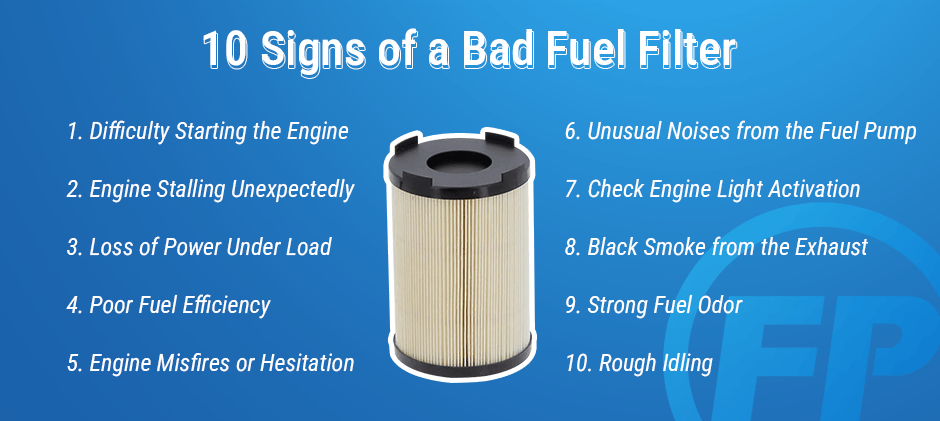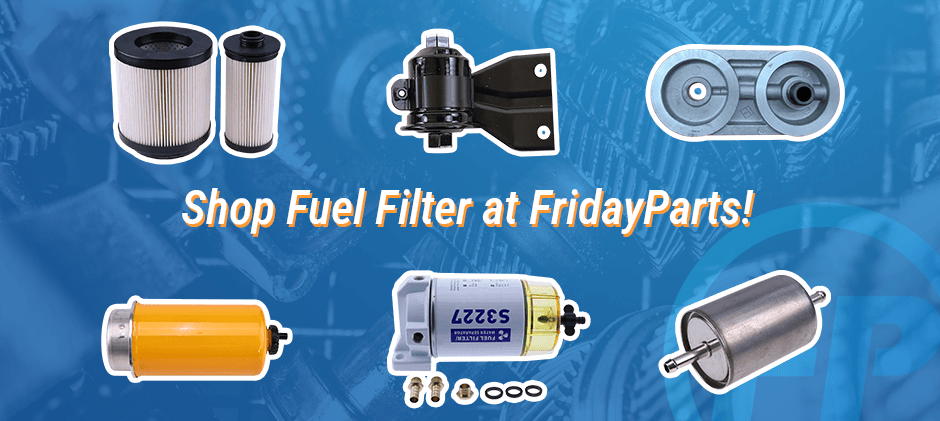Spring is approaching, and with it comes the busiest season for farming and construction. As your machinery gears up for long hours and heavy loads, your engine needs to be in peak condition. Among the many crucial components keeping your equipment running smoothly, the fuel filter plays an essential role in ensuring clean fuel reaches the engine. Do you know when it’s time to replace your fuel filter? Experiencing difficulty starting, stalling, loss of power, poor fuel efficiency, misfires, fuel pump noise, check engine light, black smoke, fuel odor, or rough idling? These are 10 signs of a bad fuel filter. In this guide, we’ll walk you through 10 unmistakable signs of a bad fuel filter—and at the end, you’ll find a helpful FAQ section to answer all your fuel filter questions. Let’s dive in!

1. Difficulty Starting the Engine
The fuel filter is there to wipe out the dust and let clean fuel flow into the engine. A clogged fuel filter restricts fuel flow to the engine, making it harder for your equipment to start. You might find yourself cranking the ignition multiple times before the engine finally roars to life—or worse, it might not start at all. If this problem worsens over time, your fuel filter could be the culprit.
2. Engine Stalling Unexpectedly
Nothing’s more frustrating than an engine that stalls right in the middle of work. A failing fuel filter can cause inconsistent fuel delivery, leading to sudden shutdowns. If your machine starts fine but stalls unpredictably—especially under load—your filter might be clogged beyond function.
3. Loss of Power Under Load
Does your tractor or excavator struggle when climbing hills or pulling heavy loads? A bad fuel filter chokes the engine, preventing it from receiving the fuel it needs to perform at full capacity. When your equipment loses power at critical moments, it’s time to inspect the fuel system.
4. Poor Fuel Efficiency
Noticing that you’re burning through fuel faster than usual? When a fuel filter is clogged, the engine compensates by working harder, leading to increased fuel consumption. If you’re refueling more often without additional work output, your fuel filter could be to blame.
5. Engine Misfires or Hesitation
A clogged fuel filter disrupts the consistent flow of fuel, causing misfires, sputtering, or hesitation when accelerating. This hesitation might feel like the engine momentarily loses power before regaining momentum—a clear sign that fuel isn’t reaching the cylinders properly.
6. Unusual Noises from the Fuel Pump
The fuel pump works overtime when the fuel filter is clogged. You might hear whining or unusual humming sounds from the fuel tank area, signaling that the pump is struggling to push fuel through a restricted filter. Ignoring this could lead to fuel pump failure—an expensive repair!
7. Check Engine Light Activation
Modern equipment is equipped with sensors that monitor fuel pressure. When the fuel filter is excessively clogged, it triggers the check engine light. If you see this warning along with performance issues, scanning for trouble codes might confirm that your filter needs replacing.
8. Black Smoke from the Exhaust
Excess fuel can build up in the system due to poor filtration, causing incomplete combustion. The result? Thick black smoke pouring from your exhaust. If your machine starts producing excessive smoke, it’s time to check the fuel filter before more severe issues arise.
9. Strong Fuel Odor
A clogged or leaking fuel filter can cause unburned fuel to accumulate in the system, leading to a strong fuel smell around your equipment. If you notice an unusual fuel odor—especially near the engine or fuel lines—it could be a sign that your filter needs replacement.
10. Rough Idling
When a fuel filter is partially clogged, it can cause inconsistent fuel delivery at low speeds, making the engine idle roughly or shake excessively. If your equipment vibrates more than usual while idling, the fuel filter might be obstructing proper fuel flow.
Fuel Filter FAQs
Where Is the Fuel Filter Located?
The location of the fuel filter depends on the type of machine. In most heavy equipment and vehicles, it’s either along the fuel line between the fuel tank and the engine or inside the fuel tank itself (in-tank filters). Some models even have multiple fuel filters, so checking the manufacturer’s manual is essential.
What Happens If the Fuel Filter Is Not Changed?
Neglecting to replace a clogged fuel filter can lead to severe issues:
- Engine performance drops significantly.
- Increased fuel pump stress, leading to premature failure.
- Higher fuel consumption and inefficiency.
- Potential engine damage due to fuel starvation.
Is Replacing a Fuel Filter a Big Job?
In most cases, no! Replacing a fuel filter is a straightforward maintenance task that can be completed with basic tools. However, some modern in-tank fuel filters require more effort to access and replace. Always follow the manufacturer’s guidelines to ensure a proper installation.

Conclusion
The engine’s efficiency relies on a clean and efficient fuel system. If you’ve noticed any of these warning signs, it’s time to replace your fuel filter! At FridayParts, we offer high-quality fuel filters for heavy machinery, ensuring your engine runs smoothly and efficiently. Shop now and keep your equipment in top shape for the season ahead!
